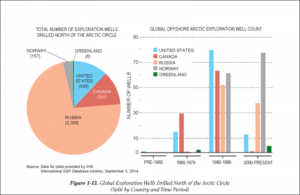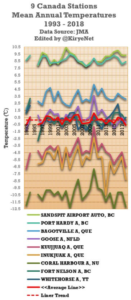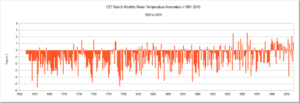by D. Middleton, April 3, 2019 in WUWT
I ran across a very lucid and informative article on Real Clear Energy today. The author is Robert Dillon, “a senior adviser on energy security at the American Council for Capital Formation and the former communications director of the Senate Energy and Natural Resources Committee.” The article includes numerous links to supporting information, particularly the National Petroleum Council’s (NPC) 2015 report on U.S. Arctic oil & gas resource potential.
The key findings of the 2015 NPC report were:
- Arctic oil and gas resources are large and can contribute significantly to meeting future U.S. and global energy needs.
- The arctic environment poses some different challenges relative to other oil and gas production areas, but is generally well understood.
- The oil and gas industry has a long history of successful operations in arctic conditions enabled by continuing technology and operational advances.
- Most of the U.S. Arctic offshore conventional oil and gas potential can be developed using existing field-proven technology.
- The economic viability of U.S. Arctic development is challenged by operating conditions and the need for updated regulations that reflect arctic conditions.
- Realizing the promise of Arctic oil and gas requires securing public confidence.
- There have been substantial recent technology and regulatory advancements to reduce the potential for and consequences of a spill.

Figure 1-1. Arctic exploration wells by country and time period. (NPC)
…
by P. Gosselin, April 3, 2019 in NoTricksZone
Canada’s CBC here recently cited “a leaked report” which claimed Canada is “warming at twice the global rate.”
According to the “leaked report”, Canada’s annual average temperature over land has warmed 1.7 C when looking at the data since 1948. But that claim is misleading when recent data is considered.
Over the past 25 years, since scientists began to warn that the planet was warming in earnest, there has not been any warming when one looks at the untampered data provided by the Japan meteorology Agency (JMA) that were measured by 9 different stations across Canada. These 9 stations have the data dating back to around 1983 or 1986, so I used their datasats.
Looking at the JMA database and plotting the stations with longer term recording, we have the following chart:

…
by P. Gosselin, April 2, 2019 in NoTricksZone
A number of scientists from the alarmist camp like to insist that there had never been such a hiatus. The latest paper contradicts that claim.
The new study states that many published analyses show that lightning activity is responsive to temperature on time scales ranging from the diurnal to the decadal and that the hiatus in global warming earlier this century can be seen in several global datasets.
Scientists found that the statistically flat behavior of the global lightning record from the NASA Lightning Imaging Sensor over the same decadal period is consistent with this hiatus in global warming.
What follows is the paper’s abstract:
Multiple records of global temperature contain periods of decadal length with flat or declining temperature trend, often termed a ‘hiatus’. Towards assessing the physical reality of two such periods (1940–1972 and 1998–2014), lightning data are examined. Lightning activity is of particular interest because on many different time scales it has been shown to be non-linearly dependent on temperature. During the earlier hiatus, declining trends in regional thunder days have been documented. During the more recent hiatus, lightning observations from the Lightning Imaging Sensor in space show no trend in flash rate. Surface-based, radiosonde-based and satellite-based estimates of global temperature have all been examined to support the veracity of the hiatus in global warming over the time interval of the satellite-based lightning record. Future measurements are needed to capture the total global lightning activity on a continuous basis.”
…
by P. Homewood, April 3, 2019 in NotaLotofPeopleKnowThat
According to CET, March 2019 was the 17th warmest on record since 1659, 1.2C higher than the 1981-2010 average.
Sound impressed? No, thought not!
The month as a whole actually seemed to be pretty unremarkable. There was some mild weather at the start of the month, accompanied by very wet weather. The last few days were also pleasant and sunny.
But unusually warm?
The graph at the top gives a bit of perspective.
First of all it is obvious that last month was pretty typical of Marchs during the last 30 years or so.
The fact that it is 1.2C above the 30-year average means little, as natural variability means some years are warmer and others cooler, such as last year. That’s what an average is.
Indeed, in the last 30 years, eleven had March anomalies of 1C or more. Six of these years were warmer than this March.
By far the warmest Marchs were in 1957 and 1938, again suggesting that there was nothing unusual about last month.
The other thing which stands out is that most Marchs used to be much colder than normal until the 1980s.
…

https://www.metoffice.gov.uk/hadobs/hadcet/cetmaxdly1878on_urbadj4.dat
see also here (WUWT)
La géologie, une science plus que passionnante … et diverse



